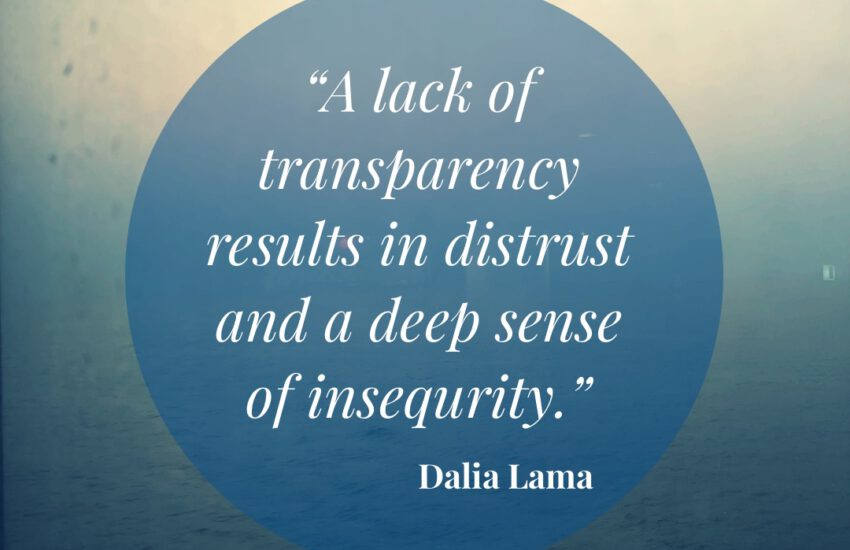The matter of attitude
If we are honest, we all know it, certain triggers (action, words, situation,…) that cause certain emotions in us and can, for example, drive us up the wall. Very often it is the emotion of feeling not taken seriously, respected or treated unfairly.
If we look at it objectively, it is a pure emotion that is triggered by an event. Sometimes there is something else behind it and we project it onto the situation. But when we look at the situation, we usually cannot say 100% whether it is really true that the person does not respect us or take us seriously. It is actually only our perception – triggered by a behaviour or something said, which we interpret as, for example, not being respected.
In the same way, misunderstandings arise. It is the way we communicate something and this includes not only what is said but also the tone of voice and our body language. But even if we recognise signs that someone is disrespecting us in exactly this situation – we don’t know if these signs are for us. Quite often, the person’s mind is elsewhere or they are still emotionally in a different situation. Or maybe we perceive it differently because we are particularly sensitive to this emotion?
Let yourself in for a thought experiment.

Let’s assume a difficult meeting is coming up and a decision has to be made, e.g. on a restructuring. Let’s assume that there are people in the meeting, such as myself, who are very attached to their team and scrutinise any kind of change for their team. Now the restructuring cannot be prevented and I am asked to make a proposal for the new set up. This is of course great because I am involved and can contribute my thoughts, concerns etc.. Now I go into this meeting unsure and with an uneasy feeling because I am already emotionally affected. And this is exactly where the mistake lies… my attitude, because now I attract everything that confirms my emotion. In my case, the feeling that no one understands me. Because that’s exactly where my attention was subconsciously. It’s like the phenomenon of pregnant women or cars… if you have a pregnant woman in your circle of friends or colleagues, you suddenly see pregnant women everywhere… it’s the same with cars, if you buy one in red, you notice all the red cars in the city. Of course you can say I’m comparing apples and oranges… but what I want to make clear here is that our focus/attention can also lie unconsciously on something and suddenly we only see that.
So I present my proposal and see the most important person in the room start typing on the computer in the middle of my presentation and after I’m done turn to someone else and say something to him. As we go along, we talk about a timetable. I suggest something, my colleagues something else, I argue against it and notice things in the discussion that make my mood sink. After a few more discussions, the mood is tense and the most important person in the room intervenes again and ends the discussion with a sentence that I would interpret as annoyed. What happened? I related the lack of attention of the important person to me by typing in the middle of my talk as well as the short conversation afterwards and subconsciously found my confirmation „nobody understands me“. My subconscious was confirmed and continued to look for lack of understanding from others. This led to me becoming more irritable and I transferred this to the group.
A further difficulty arises if this person has little or no empathy. They do not improve the situation by their dry way of communicating or arguing. Because now, if we stay with the example from above, I don’t get the emotional encouragement that I need or expect. I interpret the missing signs of encouragement or understanding as a lack of understanding. The person is not directly responsible for this, because in the end it is my perception.

But sometimes it’s just the little things that make a difference. Let’s say the other person said at the beginning of the meeting, „I know this is not an easy situation for you. But let’s try to look at all the different perspectives and find a common solution for everyone.“ My mood in the meeting would probably have been very different, because the person would have directly addressed my fears („I know this is not an easy situation for you…“ ) and minimised them with a suggestion („find a joint solution“). And we know from negotiation theory that we feel more at ease when a person proactively addresses our fears and thus gives us the feeling of understanding.
But let’s get back to the issue of attitudes, because just as the other person could have acted differently, I could have worked on my attitude. Instead of interpreting the typing on the computer as a lack of attention and interest on my part, I could have interpreted that the person was overworked and busy or had received a very urgent message that they needed to respond to. I could have addressed it proactively („Would you like us to take a break?“) instead of accepting it with frustration. I could also have been more understanding of the other side, e.g. pressure from above, etc., and changed my feelings and those of the others – by not reacting irritably.
The point I am trying to make is that we determine our actions, our perception and ultimately our feelings through our attitude. Admittedly, it is not always easy to see the feelings so rationally. I know! But through reflection we can understand them better and know why we reacted to something the way we did. It is not always as dramatic as we might have experienced it at that particular moment. Just because we perceived it that way, doesn’t mean that others did the same. Meaning reflection is very important to understand why sometimes misunderstandings, frustration or difficult situations occur.
Your attitude determines your direction.
Not all team members or individuals are reflective people and have learned that their attitudes can influence the behaviour of others and themselves. If it is difficult for me as a leader in some situations, it may not always be so easy for my team members as well. I therefore try to sharpen their understanding of their attitude and perception in my 1:1s. Quite often when there is misunderstanding or dissatisfaction between two people it has to do with attitude, perception and expectation. I let them explain the situation to me and afterwards try to let them perceive the situation differently with my outside perspective. I also think with them about how they could have reacted differently and how that could have changed the outcome of the situation. Furthermore, we consider how their current attitude, such as „the other person doesn’t respect me“ or „he doesn’t think my work is important“, contributes to the fact that the situation will not improve in the future. I then try to help them change their attitude with a new way of looking at the situation.
An example: A team member felt disrespected by a colleague because he had promised something to the client and did not ask her for advice beforehand. She was under a lot of stress because she felt she had to take the blame and even blocked herself through her frustration. She couldn’t get away from the fact that she had not been asked and therefore didn’t have the power to decide. I went through with her what could happen if she continued to hold on and block herself. Then I tried to discuss with her what could change now if we accept the situation as it is and approach it with the attitude „we do our best and try to master the new challenge together as best as we can“. It took her a day to think about it and to decide to have a different attitude. But all of a sudden her blockage was gone and she came up with solutions to meet the challenge, involve her colleague and educate him at the same time.
My advice:
- If a team member is unhappy or feels unfairly treated, take them seriously and ask them to describe the situation in which they felt unfairly treated or disrespected. Afterwards, try to describe how you would interpret the situation and thus sharpen the understanding of their attitude and their perception.
- Talk to your whole team about attitude and perception. Share with them some examples. Try to empower them to meet challenges with an optimistic we can do attitude.
- Train your team members to reflect and look at situations independently of their emotions. You can also talk about attitudes and perceptions as a team and let them share experiences of how their attitudes have helped them in their work.
- Don’t forget to take some time to reflect from time to time on your own attitude. As a role model you are influencing your team and can have a huge impact.

